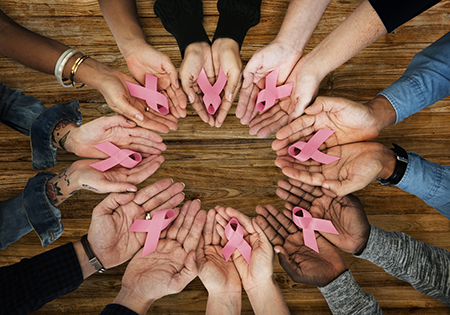 Staying healthy after you beat breast cancer
Staying healthy after you beat breast cancer
Beating breast cancer is something to celebrate. But it’s important to seek out the support and care you need to thrive during this next step too. Even when your breast cancer is in remission, your care team is still there to care for you.
You’ll have routine follow-up visits to make sure you’re doing well. You may also need care for additional health concerns you have related to cancer. Here are some of the things you can expect as you care for your health after breast cancer.
Follow-up appointments
After your breast cancer treatment, it’s likely you’ll see your care team every few months to check on your health. These follow-up visits are important not only to make sure you stay cancer-free but also to ask questions or address any concerns you have. As time passes, your follow-up care will be more spaced out, eventually becoming yearly visits.
Routine tests
As part of your follow-up care, you’ll need routine tests and screenings. Talk with your oncologist or your OB GYN about if and when you should get a mammogram. Unless you had a double mastectomy, the American Cancer Society says most women need a mammogram once a year.
Some hormones or medications taken by breast cancer patients can also affect other aspects of your women’s health. Be sure to visit your OB GYN for routine pelvic exams and ask your care provider about other screenings.
Addressing treatment side effects
Breast cancer—and the treatment that comes with it—can have many long-term effects on your body. The Susan G. Komen Foundation says these could include menopause-like symptoms, loss of sex drive, fatigue, breast pain, or lymphedema. Depending on the side effect, a specialist or rehabilitation program may help.
In some cases, breast cancer treatments can cause you to experience early menopause or problems with fertility. If you’re concerned about preserving your fertility, your OB GYN can help you navigate your options during and after treatment.
Lifestyle changes
Some healthy lifestyle changes may reduce your chances of a reoccurrence and benefit your health in other ways too. Talk to your health team about changes you can make. According to the American Society for Clinical Oncology, these might include diet changes, choosing the right exercises, stopping alcohol or smoking, and managing stress.
Continued emotional support
In addition to your physical health, breast cancer affects your emotional health too. It’s normal to have worries about your cancer coming back. Or you may have a difficult time settling into your new life as a breast cancer survivor. When dealing with this mixture of emotions, support is essential.
To cope with emotions following cancer, the National Institute on Cancer recommends staying informed and active, finding an outlet to express your feelings, and focusing on what you can control. Many cancer survivors also find a sense of fulfillment by raising awareness for breast cancer or connecting with others who have had similar experiences.
Make a survivorship plan
Overall, if you’re unsure of what this new stage looks like, a survivorship plan can help. Talk with your doctor about your next steps. From cancer history to follow-up visits to side effects, your plan should cover each aspect of your care.
Many organizations offer checklists or resources to help you know what to ask and how to take the next step forward. The CDC provides links to some survivorship plan resources and says to bring your plan and questions with you to appointments. This can help everyone, including you, stay on the same page so that you can thrive after breast cancer.
